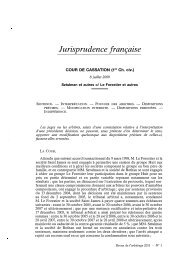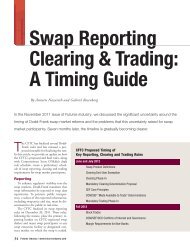What is a Broker-Dealer? - Davis Polk & Wardwell
What is a Broker-Dealer? - Davis Polk & Wardwell
What is a Broker-Dealer? - Davis Polk & Wardwell
You also want an ePaper? Increase the reach of your titles
YUMPU automatically turns print PDFs into web optimized ePapers that Google loves.
§ 1A:5 BROKER-DEALER REGULATION<br />
security future or any put, call, straddle, option, or privilege on any<br />
security future. 320<br />
Under the regulatory framework establ<strong>is</strong>hed by the CFMA, futures<br />
contracts on exempted securities or on broad-based security indices 321<br />
are subject to the sole jur<strong>is</strong>diction of the CFTC, and security futures<br />
(including futures contracts on individual securities or narrow-based<br />
security indices) are jointly regulated by the CFTC and the SEC. 322<br />
<strong>Broker</strong>-dealers who transact security futures must reg<strong>is</strong>ter with both<br />
the SEC and the CFTC. 323<br />
§ 1A:5 Exempted Securities<br />
§ 1A:5.1 Generally<br />
“Exempted securities” under the Exchange Act, as defined in<br />
section 3(a)(12), include, among others, government securities and<br />
municipal securities. 324 However, section 3(a)(12)(B)(ii) provides that<br />
for purposes of section 15 of the Exchange Act, which requires<br />
reg<strong>is</strong>tration of “brokers” and “dealers,” municipal securities are not<br />
“exempted securities.”<br />
<strong>Broker</strong>-dealers transacting exclusively in exempted securities are<br />
exempted from some prov<strong>is</strong>ions of the Exchange Act, but they are still<br />
subject to the anti-fraud and anti-manipulation prov<strong>is</strong>ions of the<br />
Exchange Act. 325<br />
320. See Exchange Act § 3(a)(56); CEA § 1a(32).<br />
321. The term “broad-based security index” <strong>is</strong> not defined in either the CEA or<br />
the Exchange Act. The term refers to a security index that <strong>is</strong> not a narrowbased<br />
security index. See SEC Release No. 34-44288 n.8 (May 10, 2001).<br />
322. See id.<br />
323. Federal law permits firms already reg<strong>is</strong>tered with either the SEC or the<br />
CFTC to reg<strong>is</strong>ter with the other agency, for the limited purpose of trading<br />
security futures, by filing a notice. SEC Guide to <strong>Broker</strong>-<strong>Dealer</strong> Reg<strong>is</strong>tration,<br />
supra note 72; see CEA § 6f(a)(2); Exchange Act § 15(b)(11);<br />
Rule 15b11-1; SEC Release No. 34-44731 (Aug. 21, 2001); SEC Release<br />
No. 34-44730 (effective Aug. 27, 2001); 66 Fed. Reg. 43,080 (Aug. 17,<br />
2001).<br />
324. See Exchange Act § 3(a)(12). Exempted securities under the Exchange Act<br />
should not be confused with those exempted securities under the Securities<br />
Act. “Exempted securities” under the Securities Act are defined in<br />
Securities Act § 3(a). <strong>Broker</strong>s or dealers who engage exclusively in transactions<br />
with respect to securities exempted from reg<strong>is</strong>tration under the<br />
Securities Act that are not also exempted securities under the Exchange<br />
Act would be required to reg<strong>is</strong>ter as such under Section 15 of the Exchange<br />
Act, absent some applicable exemption. See O. Wertheim, SEC Denial of<br />
No-Action Letter (Feb. 12, 1973).<br />
325. See, e.g., Exchange Act §§ 15(c)(1) and (2), 10(b). Anti-fraud prov<strong>is</strong>ions<br />
under Exchange Act § 9(a), however, do not apply to exempted securities.<br />
See Exchange Act § 9(f).<br />
1A–76





